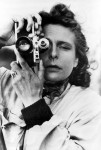
Leni Riefenstahl was born to a wealthy Berlin family in 1902 and spent her teenage years as a ballet dancer. In 1925 she transitioned into cinema and became a prominent actress, appearing in several successful movies, including Der Heilige Berg (1925) and Der Grosse Sprung (1927). In 1932 she wrote and directed Das Blaue Licht (‘The Blue Light’), an escapist fantasy that proved popular with audiences struggling at the height of the Great Depression. It won Riefenstahl several foreign film awards, accolades which brought her to the attention of the Nazi elite. Hitler viewed Riefenstahl as the ideal Aryan woman: feminine, attractive, physically fit, artistically talented and politically conservative. The admiration was returned: Riefenstahl heard the Nazi leader speak in 1932 and described the experience as an “apocalyptic vision”.
In 1933 Hitler placed Riefenstahl in charge of the NSDAP’s film-making section. Her first task was to document the party’s 1933 Nuremberg rally, capturing Hitler’s statesman-like qualities and the rising Nazi movement. The NSDAP hierarchy was impressed by the resulting film, Der Sieg des Glaubens (‘Victory of the Faith’). Through the 1930s Riefenstahl directed several other propaganda films, including her best-known work, Triumph des Willens (‘Triumph of the Will’). This 1935 film used a crew of more than 170 people and 30 cameras to capture the previous year’s NSDAP rally at Nuremberg. Riefenstahl used a range of filming and editing techniques to emphasise Hitler’s leadership and the power and unity of the Nazi movement. Riefenstahl’s next major film, Olympia (1938) was an account of the 1936 Berlin Olympic Games.
In 1945, Riefenstahl was arrested, detained and questioned by the Allies. During this interrogation, she denied or downplayed her links with Hitler and Nazism. She claimed to have been pressured or blackmailed into making Nazi propaganda films; she maintained her admiration of Hitler but added that he was surrounded and betrayed by “criminals” and “murderers”. Riefenstahl was subsequently released, and by the early 1950s, she had returned to professional film-making and photography. In 2003, aged 101, she married her long-time lover Horst Kettner and died a few weeks later.
1. Leni Riefenstahl was a young German actress and director, who in 1933 was appointed the head of the Nazi film unit.
2. She was tasked with filming NSDAP rallies, events and propaganda films reflecting the core values of the party.
3. Riefenstahl produced several films for the Nazis – but her best-known film was Triumph of the Will, which focused on the 1934 NSDAP rally at Nuremberg.
4. She also produced films of other Nazi rallies and meetings and a movie about the 1936 Berlin Olympics.
5. Despite her devotion to Hitler, Riefenstahl later distanced herself from the Nazis, claiming that she had been coerced into working for them.
© Alpha History 2018. Content on this page may not be republished or distributed without permission. For more information please refer to our Terms of Use.
This page was written by Jennifer Llewellyn, Jim Southey and Steve Thompson. To reference this page, use the following citation:
J. Llewellyn et al, “Leni Riefenstahl”, Alpha History, accessed [today’s date], https://alphahistory.com/nazigermany/leni-riefenstahl/.

